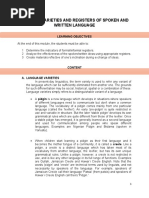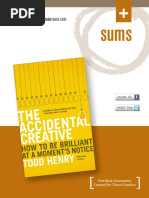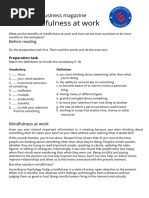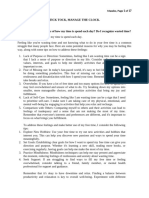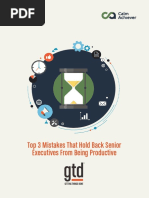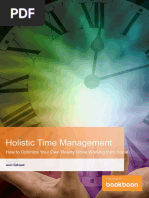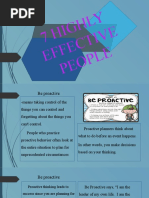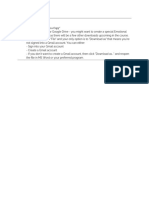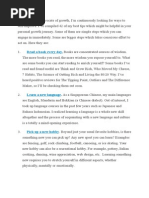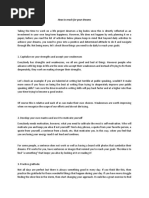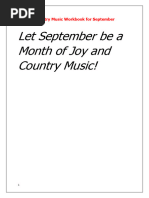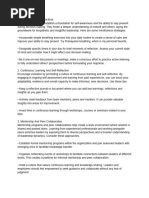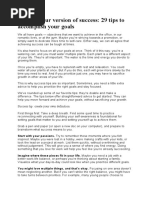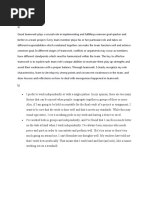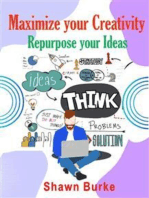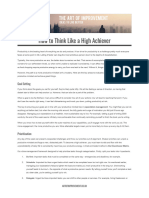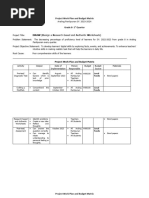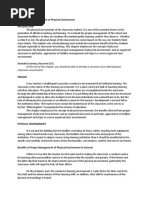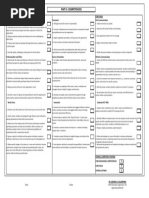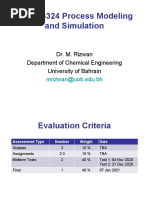121 Printing
121 Printing
Uploaded by
Mano LaCopyright:
Available Formats
121 Printing
121 Printing
Uploaded by
Mano LaOriginal Title
Copyright
Available Formats
Share this document
Did you find this document useful?
Is this content inappropriate?
Copyright:
Available Formats
121 Printing
121 Printing
Uploaded by
Mano LaCopyright:
Available Formats
Business magazine
Mindfulness at work
What are the benefits of mindfulness at work and how can we train ourselves to be more
mindful in the workplace?
Before reading
Do the preparation task first. Then read the article and do the exercises.
Preparation task
Match the definitions (a–h) with the vocabulary (1–8).
Vocabulary Definition
1. …… focus a. you start thinking about something other than what
2. …… your mind wanders you’re doing
3. …… to become conscious b. the ability to concentrate on something
of something c. to become aware of or start to notice a particular
4. …… inefficient thing
5. …… multiple d. having many or different types
6. …… productivity e. grateful and glad about something
7. …… thankful f. to move your attention from one thing to another
8. …… to shift your attention g. the rate at which a person produces useful work
from/to something h. working in a way that wastes time, money or other
resources
Mindfulness at work
Have you ever missed important information in a meeting because you were thinking about
something else? Or eaten your lunch at your desk without even noticing what it tasted like?
If this sounds familiar, you’re not alone. Research has shown that 47 per cent of the time,
people are thinking about something other than what they’re doing. People’s minds wander,
whether they are trying to read important emails, speaking to clients, updating the sales
figures, or talking to colleagues. Interestingly, it was also found that people were less happy
when their minds were wandering than when they were not. Being mindful and paying
attention to the present can not only improve our focus, but it can also help us reduce stress,
improve relationships and allow us to feel more connected with the present moment.
But what exactly is mindfulness?
According to Psychology Today, mindfulness is a state of active, open attention to the present.
When one is mindful, one observes one’s feelings and thoughts from a distance without
judging them as good or bad. Being mindful means living in the moment and actually
© British Council 2020 www.britishcouncil.org/learnenglish
experiencing what life has to offer. There are different ways that we can train our minds to do
this. One easy and effective way is through meditation and mindfulness exercises.
So, how can we learn to be more mindful at work?
1. Make time for short mindfulness exercises.
You might not have time to sit down to do long mindfulness meditations every day, but you
can take a moment to focus on your breathing and become conscious of your senses. In A
Monk’s Guide to Happiness, Gelong Thubten recommends practising micro moments of
mindfulness. One way to do this is by sitting with a good posture and becoming aware of the
sounds you can hear. Through exercises such as this one, you can learn to focus your
attention and train yourself to become more mindful.
2. Be aware of what you’re doing.
Mindfulness is about being present and consciously experiencing every moment.
When you’re talking to your colleagues, pay attention to their body language, their intonation
and what they’re really saying. When you’re sitting at your desk, be aware of the sensation of
contact between your body and the chair. If you find your mind wandering from what you’re
doing, notice those thoughts and bring your attention back to the present.
3. Make a list of things you are grateful for.
In our busy day-to-day lives, it’s easy to only focus on things that have gone wrong and be
negative about the people and the things around us. By making a list of things we’re thankful
for, we can have a more balanced view of our reality. Being mindful of the things that are
going well can also help improve our motivation, creativity and productivity.
4. Avoid multitasking.
Do you sometimes try to reply to emails while attending a meeting? Or look through your
work chats while having your lunch? Doing multiple things at a time might make you feel more
productive, but it often means you are not concentrating fully on any of the things you are
trying to do. This makes you inefficient, more likely to make mistakes and worse at ignoring
things that are not important. It can also make you unhappier as you lose connection with the
present moment. So the next time you find yourself shifting your attention between multiple
things, allow yourself a moment to decide what you really need to focus on and try to give
that your full attention.
The more we practise doing these four things regularly, the more we can train ourselves to be
more mindful at work and the more we see its benefits. So, bring your mind back from
whatever you’re thinking about and turn your attention to the here and now.
© British Council 2020 www.britishcouncil.org/learnenglish
Sources:
• https://greatergood.berkeley.edu/article/item/does_mind_wandering_make_you_unha
ppy
• https://www.mindful.org/10-ways-mindful-work/
• https://www.nytimes.com/guides/well/be-more-mindful-at-work
• https://www.forbes.com/sites/ashleystahl/2017/09/14/how-to-practice-mindfulness-at-
work/#482e90114d57
• https://www.psychologytoday.com/us/basics/mindfulness
Tasks
Task 1
Circle the best answer.
1. Having a wandering mind …
a. is common.
b. has no negative side effects.
c. can’t be helped.
d. makes people happier.
2. Mindfulness can help you …
a. become more intelligent.
b. do several things at once.
c. get physically fit.
d. improve your social relationships.
3. Mindfulness is …
a. another word for meditation.
b. paying attention to the present.
c. a kind of positive thinking.
d. getting better at deciding if things are good or bad.
4. The author recommends becoming more mindful by …
a. paying attention to your breath and senses.
b. dedicating an hour a day to meditation.
c. trying to think nothing at all for very short moments.
d. sitting in a comfortable chair.
© British Council 2020 www.britishcouncil.org/learnenglish
5. Being mindful at work means …
a. being positive with your colleagues.
b. changing tasks often so you don’t get bored.
c. focusing on whatever you’re doing at that moment.
d. sometimes doing two tasks at once to be more efficient.
6. Being grateful for things helps us to …
a. recognise our own strengths and weaknesses.
b. see the good things as well as the bad things.
c. be organised and use lists.
d. shut out negative thoughts.
7. Multitasking is …
a. good for productivity but bad for your mental health.
b. useful but only for short amounts of time.
c. fine for people who have a certain type of brain.
d. bad for productivity, concentration and happiness.
8. The author finishes the article by encouraging the reader to …
a. take a deep breath and notice how they feel.
b. start turning their dreams into reality.
c. try to accept that uncertainty is part of life.
d. focus their attention on the present moment.
Task 2
Complete the sentences with words from the box.
unhappier attention minds productivity
conscious multitasking grateful benefits
1. In our busy modern lives, it is common for our ……………………………… to wander, even when
we’re doing something important.
2. We often try to do several things at once, but research shows that ………………………………
makes us less productive and more stressed.
3. Mindfulness is paying ……………………………… to the present moment.
© British Council 2020 www.britishcouncil.org/learnenglish
4. Being mindful helps us become more ……………………………… of what we’re doing and the
people around us.
5. Writing lists of what we are thankful or ……………………………… for helps us to achieve a more
balanced view of reality.
6. When we improve motivation and concentration, we also find that we improve
……………………………… .
7. When we multitask or get distracted, we’re likely to feel ……………………………… .
8. The more we practise mindfulness, the more we see its ……………………………… .
Discussion
What do you do to help yourself be more mindful at work?
© British Council 2020 www.britishcouncil.org/learnenglish
You might also like
- Guide To Founder RetreatsDocument29 pagesGuide To Founder RetreatsKalstormNo ratings yet
- How To Think LogicallyDocument26 pagesHow To Think Logicallyfmu2023zadochnoNo ratings yet
- Module 4 Varieties and Registers of Spoken and Written LanguageDocument8 pagesModule 4 Varieties and Registers of Spoken and Written LanguageVanessa Jay Trapa Donato100% (6)
- Educ 2315 Unit Plan Template 1 1Document12 pagesEduc 2315 Unit Plan Template 1 1api-41926968750% (2)
- Sums The Accidental Creative PDFDocument10 pagesSums The Accidental Creative PDFGigi Ion100% (1)
- LearnEnglish Business Magazine MindfulnessatworkDocument6 pagesLearnEnglish Business Magazine MindfulnessatworkTamayNo ratings yet
- Mindfulness at Work: Before ReadingDocument5 pagesMindfulness at Work: Before ReadingMoises ZapataNo ratings yet
- MindfulnessDocument5 pagesMindfulness20265001No ratings yet
- Yeuwill Get HireDocument6 pagesYeuwill Get HireMoises ZapataNo ratings yet
- Poy One DavDocument5 pagesPoy One DavMoises ZapataNo ratings yet
- KonanskakarotoDocument5 pagesKonanskakarotoMoises ZapataNo ratings yet
- Mindfulness at Work: Before ReadingDocument3 pagesMindfulness at Work: Before ReadingRAYSHA ERZA PUSPITA S1 Pendidikan Bahasa InggrisNo ratings yet
- 10 Mindfulness Techniques To Practice at WorkDocument15 pages10 Mindfulness Techniques To Practice at WorkTanja Miladic100% (1)
- Mindfulness Student Worksheet 0Document3 pagesMindfulness Student Worksheet 0Thaiane OliveiraNo ratings yet
- 3 books summaryDocument8 pages3 books summarymakeupslashpkNo ratings yet
- Mindful Productivity Audit Ness Labs UpdatedDocument9 pagesMindful Productivity Audit Ness Labs UpdatedjoNo ratings yet
- Decluttering Your Mind and Your LifeDocument5 pagesDecluttering Your Mind and Your LifeRoshean Bliss DomingNo ratings yet
- Becoming A Better LearnerDocument29 pagesBecoming A Better LearnerIrtiza Shahriar ChowdhuryNo ratings yet
- 10 Ways How To Improve YourselfDocument4 pages10 Ways How To Improve YourselfJudy Ann Leyco BartolataNo ratings yet
- TIME MANAGEMENTDocument17 pagesTIME MANAGEMENTmmasebo.tz0177No ratings yet
- SYM 3 U03 ReadingWorksheetDocument6 pagesSYM 3 U03 ReadingWorksheetMohamedNo ratings yet
- Tips On Improve Ing ConcentrarionDocument11 pagesTips On Improve Ing ConcentrarionsumitpankajNo ratings yet
- Why Top-Leaders Are Practicing Mindfulness - and Four Steps To Get StartedDocument6 pagesWhy Top-Leaders Are Practicing Mindfulness - and Four Steps To Get Startedclashof clansNo ratings yet
- Calm Achiever Busy People MistakesDocument7 pagesCalm Achiever Busy People MistakesAnshumali Saxena100% (1)
- The Productivity Blueprint: 13 Effortless Hacks On How To Rewire Your Brain To Focus On What is ImportantFrom EverandThe Productivity Blueprint: 13 Effortless Hacks On How To Rewire Your Brain To Focus On What is ImportantNo ratings yet
- Work Smarter, Not Harder: 21 Time Management Tips To Hack ProductivityDocument7 pagesWork Smarter, Not Harder: 21 Time Management Tips To Hack ProductivityPetchiammal S100% (1)
- 7 Guaranteed Ways to Reduce Stress, Stop Feeling Overwhelmed at Work, and Get Your Life Back - My cheat sheet for building up your resilience and wellbeingFrom Everand7 Guaranteed Ways to Reduce Stress, Stop Feeling Overwhelmed at Work, and Get Your Life Back - My cheat sheet for building up your resilience and wellbeingNo ratings yet
- 42 Practical Ways To Improve YourselfDocument13 pages42 Practical Ways To Improve YourselfKarthikeyan100% (2)
- Working in GroupsDocument16 pagesWorking in Groupscolin robertsNo ratings yet
- Holistic Time ManagementDocument57 pagesHolistic Time Managementernu anggoNo ratings yet
- Making SuggestionDocument6 pagesMaking SuggestionMỹ LinhNo ratings yet
- Discuss The Questions With A Partner.: 1. Lead-InDocument6 pagesDiscuss The Questions With A Partner.: 1. Lead-InSofia RodriguezNo ratings yet
- Notes On Deep Work and Focus and Meaningful ProductivityDocument15 pagesNotes On Deep Work and Focus and Meaningful ProductivityMarc Gris100% (1)
- 1723638974-(TV) Are Habits Important_ (3)Document10 pages1723638974-(TV) Are Habits Important_ (3)zvd.yanaNo ratings yet
- Learn To Manage Your Time WellDocument10 pagesLearn To Manage Your Time WellMatthew Drey Eiver ZuesNo ratings yet
- 40 Days Transformation WorkbookDocument14 pages40 Days Transformation Workbooknavarro84alexNo ratings yet
- Sacred Scribing, Keymakers, S3 E6Document8 pagesSacred Scribing, Keymakers, S3 E6Cheryl LynnNo ratings yet
- How To Focus (With Pictures) - WikiHowDocument16 pagesHow To Focus (With Pictures) - WikiHowdadanjunkmailNo ratings yet
- 7 Hig HLY Effe Ctiv E Peop LEDocument24 pages7 Hig HLY Effe Ctiv E Peop LEHezil Mae MancaoNo ratings yet
- What Is AttentionDocument4 pagesWhat Is AttentionSrishabh DeoNo ratings yet
- Conquer your Concentration: The Ultimate Guide to Focus your Thoughts and Build the Self Discipline Needed to Get Organised and Increase Productivity!From EverandConquer your Concentration: The Ultimate Guide to Focus your Thoughts and Build the Self Discipline Needed to Get Organised and Increase Productivity!No ratings yet
- Emotional Intelligence Digital Workbook - Class VersionDocument38 pagesEmotional Intelligence Digital Workbook - Class VersionmanickajaminNo ratings yet
- HG G9 Module 4 Edited VersionDocument6 pagesHG G9 Module 4 Edited VersionEduardo QuidtaNo ratings yet
- 42 Tips To Grow Beyong Your Curent SelfDocument10 pages42 Tips To Grow Beyong Your Curent SelfMarius TzNo ratings yet
- 42 Practical Ways To Start Working On Self-Improvement - LifehackDocument8 pages42 Practical Ways To Start Working On Self-Improvement - LifehackEnola ThousandNo ratings yet
- 15 PD SkillsDocument16 pages15 PD SkillsrishigivingawayNo ratings yet
- HABITS 365 Book ?Document27 pagesHABITS 365 Book ?Fahad Umat khanNo ratings yet
- Mindfulness Book - Chapter 1Document5 pagesMindfulness Book - Chapter 1clararobertsoteroNo ratings yet
- How To Reach For Your DreamsDocument5 pagesHow To Reach For Your DreamsCharmaine Alipayo100% (1)
- Country Music Workbook For SeptemberDocument69 pagesCountry Music Workbook For SeptemberRia SahaNo ratings yet
- Untitled DocumentDocument19 pagesUntitled Documentmanish.ee.2.718No ratings yet
- 4-Page 7 Ways TM 20Document4 pages4-Page 7 Ways TM 20Jose EstradaNo ratings yet
- 29 TipcDocument8 pages29 TipcABDELMALEK EL KHIDERNo ratings yet
- Nouveau Document Microsoft WordDocument8 pagesNouveau Document Microsoft WordABDELMALEK EL KHIDERNo ratings yet
- Assignment I Human Resource Management The 7 Habits of Highly Effective PeopleDocument4 pagesAssignment I Human Resource Management The 7 Habits of Highly Effective PeopleSharmila Subramanian100% (1)
- SDMDocument7 pagesSDMJawad HussainNo ratings yet
- How To Think Like A High AchieverDocument2 pagesHow To Think Like A High AchieverPRANAV NARAYANANNo ratings yet
- NLC Accomplishment ReportDocument24 pagesNLC Accomplishment Reportces112345balNo ratings yet
- Quot English Quot Ingilis Dili Asas Xarici Dil Fanni Uzra 6 Ci Sinif Ucun Metodik Vasait 1630599281 359Document163 pagesQuot English Quot Ingilis Dili Asas Xarici Dil Fanni Uzra 6 Ci Sinif Ucun Metodik Vasait 1630599281 359Lala BayramovaNo ratings yet
- Determinants of PersonalityDocument9 pagesDeterminants of Personalitysoubhagya biswalNo ratings yet
- Art Tour Parental-ConsentDocument2 pagesArt Tour Parental-ConsentJardo de la PeñaNo ratings yet
- Chap07 Coping With Depression - Relationships PDFDocument18 pagesChap07 Coping With Depression - Relationships PDFFrescura1No ratings yet
- Vocabulary Enrichment Programme SampleDocument8 pagesVocabulary Enrichment Programme SampleGeanina Ionela Petrea GheorghiuNo ratings yet
- 2019 OPCRF JOY EmptyDocument9 pages2019 OPCRF JOY EmptyMARY JERICA OCUPENo ratings yet
- Chapter 2 - Mentoring and CoachingDocument16 pagesChapter 2 - Mentoring and Coachingp74yjwwhbkNo ratings yet
- Draper-Harrison Edulearn13 ARTDocument11 pagesDraper-Harrison Edulearn13 ARTCrhistian Esteban Hidalgo ValbuenaNo ratings yet
- 4.1 Hermeneutic PhenomenologyDocument10 pages4.1 Hermeneutic Phenomenologyjohn100% (1)
- Rationale 4Document2 pagesRationale 4api-246221764No ratings yet
- DAIMSR Project Front Pages (1) AnaDocument7 pagesDAIMSR Project Front Pages (1) AnaRamu KhandaleNo ratings yet
- Literature ReviewDocument3 pagesLiterature ReviewAakashSharmaNo ratings yet
- Assignment Week 5 Sila CelebiDocument12 pagesAssignment Week 5 Sila Celebiasliduru1802No ratings yet
- Unit 1 Launching With Small MomentsDocument64 pagesUnit 1 Launching With Small MomentsErin Klein100% (4)
- DLL G9 COOKERY (Week1)Document35 pagesDLL G9 COOKERY (Week1)Adaah LuczonNo ratings yet
- CURRICULUM MAP in ESP 8Document1 pageCURRICULUM MAP in ESP 8gabrielNo ratings yet
- Ap Budgetworkplan 2023-2024Document7 pagesAp Budgetworkplan 2023-2024Rovel G. HuertaNo ratings yet
- CHAPTER 12.. Physical Environment12Document3 pagesCHAPTER 12.. Physical Environment12Kevin LamioNo ratings yet
- Dependable Strengths ExercisesDocument4 pagesDependable Strengths ExercisesjellyllasiddiqueNo ratings yet
- Ipcrf Part II CompetenciesDocument1 pageIpcrf Part II CompetenciesStaCatalina DistrictTwoNo ratings yet
- Ethics, Society and EmployabilityDocument7 pagesEthics, Society and Employabilityfestuschepchieng13No ratings yet
- ME5509 Acoustics Fire Lifts and Drainage v2Document3 pagesME5509 Acoustics Fire Lifts and Drainage v2Lyf AquaNo ratings yet
- Detailed Lesson Plan MS Excel - ChartDocument5 pagesDetailed Lesson Plan MS Excel - ChartJojit Garcia75% (12)
- Developing Intercultural Competencies: An Educational Imperative For The CenturyDocument22 pagesDeveloping Intercultural Competencies: An Educational Imperative For The CenturyБибифатима БNo ratings yet
- CHENG324 Process Modeling and Simulation: Dr. M. Rizwan Department of Chemical Engineering University of BahrainDocument21 pagesCHENG324 Process Modeling and Simulation: Dr. M. Rizwan Department of Chemical Engineering University of BahrainEman AlbastawyNo ratings yet
- Terminology BekturganovaDocument10 pagesTerminology BekturganovadeliyaNo ratings yet
- Activity Sheet 10.1 Lesson Plan Template - 5E ModelDocument4 pagesActivity Sheet 10.1 Lesson Plan Template - 5E Modeleverlyn easterNo ratings yet


